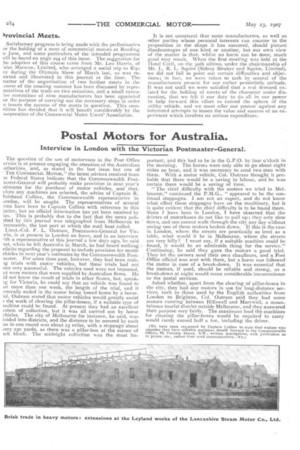Postal Motors for Australia.
Page 2

If you've noticed an error in this article please click here to report it so we can fix it.
Interview in London with the Victorian Postmaster-General.
The question of the use of motorvans in the Post Office ervice is at present engaging the attention of the Australian uthorities, and, as stated in the last issue but one of
• THE COMMERCIAL MOTOR," the latest advices received from 3e Federal States indicate that the Commonwealth Postaster-General will probably make provision in next year's stimates for the purchase of motor vehicles, and that, efore any machines are selected, the advice of Captain R. luirhead Collins, the Commonwealth representative in .ondon, will be sought. The representatives of several rms have been to Captain Collins with reference to this tatter, but no official information has yet been received by im. This is probably due to the fact that the news pubshed by this journal was telegraphed from Melbourne to 'reemantle, the last port at which the mail boat called. Lieut.-Col. F. L. Outran', Postmaster-General for Vic.wia, is at present in London on leave, and in an interview ith a representative of this journal a few days ago, he said lat, when he left Australia in March, he had heard nothing efinite regarding the proposal to include provision for motor ehicles in next year's estimates by the Commonwealth Postulster. For some time past, however, they had been makig trials with motor vehicles, but these trials had not een very successful. The vehicles used were not imported, ut were motors that were supplied by Australian firms. He id not know the result of trials in other States, but, speakig for Victoria, he could say that no vehicle was found to ist more than one week, the length of the trial, and it enerally ended in the motor being towed home by a horse. !oh Outrarn stated that motor vehicles would greatly assist the work of clearing the pillar-boxes, if a suitable type of iachine could be found. At present they had an excellent ,,stem of collection, but it was all carried out by horse :Notes. The city of Melbourne for instance, he said, was ivided into districts, and the distance to be covered by each an in one round was about 25 miles, with a stoppage about very 250 yards, as there was a pillar-box at the corner of ach block. The midnight collection was the most im
portant, and this had to be in the G.P.O. by four o'clock in the morning. The horses were only able to go about eight miles an hour, and it was necessary to send two men with them. With a motor vehicle, Col. Outram thought it probable that there would be a saving in labour, and he was certain there would be a saving of time.
" The chief difficulty with the motors we tried in Melbourne," continued the P.M.G., " appeared to be the continual stoppages. I am not an expert, and do not know what effect these stoppages have on the machinery, but it is quite evident that the chief difficulty is to be found there. Since I have been in London, I have observed that the drivers of motorbuses do not like to pull up ; they only slow down, and one cannot walk through the city any day without seeing one of these motors broken down. If this is the case in London, where the streets are practically as level as a table, what would it be in Melbourne, where the streets are very hilly? I must say, if a suitable machine could be found, it would be an admirable thing for the service." Continuing, he said they gave the motors a good trial. They let the owners send their own chauffeurs, and a Post Office official was sent with them, but a horse van followed the motor in case of a break-down. It was essential that the motors, if used, should be reliable and strong, as a break-down at night would mean considerable inconvenience to the postal services.
Asked whether, apart from the clearing of pillar-boxes in the city, they had any motors in use for long-distance services, such as those used by the English authorities from London to Brighton, Col. Outram said they had some motors running between Hillswell and Marywell, a mountainous tourist district outside Melbourne, and they answered their purpose very fairly. The maximum load the machines for clearing the pillar-boxes would be required to carry would rarely exceed half a ton, including the driver.
[we have been requested by Captain Collins to state that makers who consider they have suitable machines should forward to the Commonwealth Offines, 72, Victoria Street, S.W., written descriptions, with rarticulars as to prices, etc., rather than mid teprekentatives.—ED,1






























